
Distinguished Faculty Lecture Series
Distinguished Faculty Lecture Series
Introduction
Established in 1974, the annual Distinguished Faculty Lecture is dedicated to acknowledging the work of our most esteemed and accomplished faculty members. The lecture series not only honors individual faculty members and their achievements, but also celebrates the values of academic excellence that we share as a community. Each honoree is presented with the Chancellor’s Medal, the highest recognition bestowed upon faculty by the campus.
Fall 2025 and Spring 2026 Lectures

Ramesh K. Sitaraman
Distinguished Professor, Manning College of Information and Computer Sciences
Keeping the World Connected: Building a Faster, Smarter, and Greener Internet
March 3, 2026
4 p.m. at Old Chapel
Today, the internet is an essential part of daily life—a platform for communication, commerce, education, and innovation. But at the turn of the century, the internet was far from reliable: It was a fragile patchwork of disconnected networks, plagued by frequent failures and poor performance. In this talk, Professor Sitaraman will share his 25-year journey of how his research helped transform that early internet into the fast, resilient, and globally accessible infrastructure we depend on today. His work made it possible for web pages to load quickly and videos to stream smoothly—even in the most remote corners of the world. During times of global crisis, such as 9/11 and the COVID-19 pandemic, his research enabled the internet to handle unprecedented surges in traffic, keeping the world connected. Now, as artificial intelligence (AI) reshapes the digital landscape, we face a new research challenge: delivering AI-enabled intelligent services over the internet to billions of people worldwide while grappling with the rising energy demands of massive AI data centers. The next chapter of his work is focused on building a more sustainable internet—one that’s not only faster and smarter but also powered by clean, renewable energy.

Matthew Westgate
Chair and Professor, Department of Music and Dance
The Art of Conducting: Creating Community Through Music
December 2, 2025
4 p.m. at Old Chapel
Using his skills and expertise as a professional conductor and musical leader, Professor Westgate will share methods (both musical and non-musical) that bring people together around common goals and, in turn, help connect them as a community. Attendees will learn methods to tap into the energy that exists within themselves, find ways to focus their intent, and explore what it feels like to lead, empower, and connect others without words. The lecture will include an opportunity to learn basic conducting techniques, examine meaning expressed through universal body language, and discuss the positive effects that learning to communicate nonverbally can have on everyone. Participants will end the session by making some music together. An internationally renowned conductor and pedagogue, Westgate conducts the UMass Wind Ensemble and is the department chair for music and dance.
Spring 2025 Lectures

Kalpana Poudel-Tandukar
Professor, Elaine Marieb College of Nursing
Building Strength from Within: Engaging Refugees in Designing, Implementing, and Evaluating Strength-Based Mental Health Interventions to Reduce Stress, Anxiety, and Depression
April 3, 2025
4 p.m. at Old Chapel
Refugees bear the highest burden of mental health problems due to various traumatic experiences, including fleeing war, witnessing separation and death due to conflict, integrating into a new culture with limited communication, and managing social isolation. Existing interventions are primarily based on treatment models to improve access to and quality of care for refugees with diagnosed mental health problems in the U.S.; however, strength-based interventions aimed at preventing or reducing mental health problems are limited. Professor Kalpana Poudel-Tandukar will present the results of her community-engaged participatory action research studies to reduce stress, anxiety, and depression among Afghan, Bhutanese, and Ukrainian refugees resettled in western Massachusetts. She will discuss how she engages and empowers the refugee communities in analyzing community health needs and assets, setting health priorities, developing and evaluating program strategies, and disseminating results to impact community health positively.

David Julian McClements
Distinguished Professor, Department of Food Science
College of Natural Sciences
Future Foods: How Modern Science Is Changing the Way We Eat
February 20, 2025
4 p.m. at Old Chapel
What will we eat in the future? We are in the midst of an unprecedented era of scientific and technological advances that are transforming the way our foods are produced and consumed. These technological advances are urgently needed to address critical issues linked to the modern food supply, such as its sustainability, environmental impact, healthiness, and ethics. In this lecture, Distinguished Professor David Julian McClements will share the science behind the creation of next-generation foods assembled from alternative protein sources, such as plants, microbes, and insects, rather than from animal sources (meat, fish, eggs, and milk). He will particularly focus on the development of affordable, convenient, nutritious, and safe alternative protein foods, demonstrating how it may be possible to have a healthy and sustainable diet that is good for us, animals, and the planet in the future.

Qiangfei Xia
Dev and Linda Gupta Professor, Department of Electrical and Computer Engineering
College of Engineering
Future Computers Will Be Like the Human Brain
March 27, 2025
4 p.m. at OId Chapel
The upswing of ChatGPT has sparked tremendous interest in artificial intelligence. Unfortunately, the computer systems behind these achievements consume as much electricity as a small power plant, and such supercomputers will cause severe issues of energy, environment, and social equity unless we change our current hardware. Cue the human brain: It’s perhaps the world’s most powerful computational system, but we have yet to develop AI systems that can perform simple human-like cognitive functions with the reliability and efficiency of their biological counterparts. Professor Qiangfei Xia will share his research on building brain-inspired computing systems and their applications in machine intelligence. He will also review the evolution of computer hardware and elaborate on the importance of the brain-like computer under the CHIPS and Science Act—the most significant investment in research and development by the U.S. government to date.
Fall 2023 and Spring 2024 Lectures

Richard van Emmerik
Professor, Department of Kinesiology
School of Public Health and Health Sciences
Understanding the Movement Challenges in People with Multiple Sclerosis
April 30, 2024
4:00 p.m.
Multiple sclerosis (MS) is a chronic disease of the central nervous system and the most common neurological disease that affects people between ages 20 and 50. Although people living with MS consistently rate walking and balance impairment as one of the greatest negative impacts on their quality of life, our understanding of the cause of movement instability in these individuals remains limited. In this lecture, Professor Richard van Emmerik will give an overview of the history, etiology, and symptoms of MS; explain the different subtypes of the disease; and discuss the specific movement sensory functions that are impacted in MS. Rounding out the lecture will be a discussion of how the latest research in MS may help in developing innovative treatments for balance and gait dysfunction, and how adaptive physical activity programs may be beneficial for overall well-being in people with MS.

Ayano Kataoka
Professor of Percussion, Department of Music and Dance
College of Humanities and Fine Arts
The Rhythm of Change
February 29, 2024
4:00 p.m.
In this three-part lecture, percussionist and marimbist Ayano Kataoka will dive into a personal and historical exploration of percussion music in Japan, with emphasis on the marimba, Japanese culture, and the influence of Keiko Abe. Listeners will then learn the role of the percussionist as actress, paying close attention to the intersection of theater, music, and visuality in performance. The discussion will conclude with a look at the evolution of percussion as an exemplar of world culture, with Professor Kataoka showing how innovations in the expression of timbre, rhythm, and physicality are pushing music in dynamic new directions. To illustrate the performance of music, each section will showcase the works of Keiko Abe, Stuart Saunders Smith, and Iannis Xenakis.

Jeffrey Holmes
Professor of Piano and Trumpet, Department of Music and Dance
College of Humanities and Fine Arts
The Art of Jazz Improvisation: Conversations in Spontaneous Composition
November 15, 2023
4:00 p.m.
Jeffrey Holmes, professor of music and director of Jazz and African American Music Studies, will provide a historical overview of jazz improvisations that have defined the stylistic vocabulary through the 20th century and beyond. His lecture will include live demonstrations and recorded excerpts to provide context and analytical perspective. Accompanied by UMass colleagues Fumi Tomita (bass) and Tom Giampietro (drums), as well as vocalist Dawning Holmes, Professor Holmes will examine celebrated solos by Louis Armstrong, Ella Fitzgerald, Clifford Brown (recorded with UMass Amherst’s own iconic drummer, Max Roach), Miles Davis, Chick Corea, and more. Holmes’s ensemble will also create an on-the-spot improvisational piece to further demonstrate concepts utilized in soloing and group interaction. A nationally published composer/arranger, Holmes directs the award-winning UMass Jazz Ensemble I and Studio Orchestra and is artistic director of the popular Jazz in July Summer Music Programs.

Sonya Atalay
Professor, Department of Anthropology
College of Social and Behavioral Sciences
Repatriation and Reclaiming as Teachers for Braiding New Research Worlds
October 26, 2023
4:00 p.m.
A leading global scholar in Indigenous archeology, Professor Sonya Atalay’s lecture will focus on ways that repatriation of ancestral remains and reclaiming traditional knowledge and cultural places provide valuable lessons for creating new approaches to research. She will highlight her work with Native American nations using arts-based research and knowledge mobilization methods, making her research broadly accessible through collaborative comics and science-based graphic novels, storybaskets, and counter-mapping. She will also discuss how lessons drawn from research related to repatriation and reclaiming provide models for braiding Western and Indigenous science, leading to the newly established Center for Braiding Indigenous Knowledges and Science—a global partnership that will help address the urgent threat of climate crisis and its impacts on cultural places and food security.
Fall 2022 and Spring 2023 Lectures

Young Min Moon
Professor and Chair of the Department of Art
College of Humanities and Fine Arts
The Aftereffects of War in Contemporary Korean Art
April 12, 2023
4:00 p.m.
Over the past century, the Korean Peninsula has seen a succession of violent ruptures, and it remains a flashpoint for the world’s superpowers. The peninsula is still gripped by Cold War geopolitics, long after the fall of the Communist bloc. In the aftermath of the Korean War, South Korea was built on androcentric nation building, anti-communism, and a relentless drive for industrialization. In the period of compressed development from the poverty-stricken 1950s to the global success of today, countless lives have been lost to the state apparatus—lives whose memories must be contextualized in the history and politics of the Cold War.

F. Peter Schloerb
Professor in the Department of Astronomy
College of Natural Sciences
UMass and the Large Millimeter Telescope
March 23, 2023
4:00 p.m.
In 2019, the first image ever made of a black hole triggered international excitement. The stunning image brought enormous attention to the University of Massachusetts, which played a key part in the global collaboration that captured the image.
The image of the black hole was made possible by UMass Amherst’s leadership in the construction and operation of the 50-meter-diameter Large Millimeter Telescope (LMT), located atop a mountain in Mexico. One of the university’s most ambitious scientific projects, the LMT was built jointly by the country of Mexico and UMass Amherst.

Gretchen Holbrook Gerzina
Paul Murray Kendall Chair in Biography and Professor of English
College of Humanities and Fine Arts
Forgotten Lives: What They Mean and Why They’re Important
February 8, 2023
4:00 p.m.
Professor Gretchen Holbrook Gerzina is an internationally acclaimed scholar widely known for her work in British literary and cultural studies. Much of her award-winning work explores forgotten lives. Most recently, an updated edition of her book Black London was published in the U.K. under the new title Black England: A Forgotten Georgian History, with a foreword by Zadie Smith. Gerzina’s work reaches beyond the field of literary studies and has made significant contributions to scholarship in history, art history, and African American studies.

Erin Baker
Distinguished Professor in the Department of Mechanical and Industrial Engineering
College of Engineering; Faculty Director of the Energy Transition Institute
Climate Change Solutions: Finding Common Ground When Experts and Models Disagree
November 9, 2022
4:00 p.m.
Climate change is a code red for humanity. We need to address it and do it fast. But because the climate problem is highly complex, it is hard to characterize how specific actions will lead to specific outcomes. Experts, methods, and models provide conflicting information, resulting in deep uncertainty. And this uncertainty is impeding the world’s ability to respond to climate change.
Spring 2022 Lectures

Lynnette Leidy Sievert
Professor, Department of Anthropology
The Evolution of Menopause and Post-Reproductive Life
April 4, 2022
4:00 p.m.
Almost all fish, amphibians, and reptiles continue egg and sperm production throughout life. In contrast, female mammals are born with, or soon after birth achieve, a finite number of eggs that slowly dwindles across the lifespan to the point of exhaustion. In humans, this results in menopause. The evolution of female menopause and post-reproductive life seems counterintuitive. Why select for the cessation of reproduction before the end of the lifespan? Some consider menopause and post-reproductive life as direct products of natural selection during human evolution. However, Professor Sievert, who holds international stature as a top expert on menopause, argues that, from a cross-species perspective, menopause and post-reproductive life are the indirect byproducts of natural selection for other traits. Patterns of early egg production and lifelong egg loss, when coupled with a lengthened lifespan, explain the appearance of menopause and post-reproductive life in humans, whales, and other mammals.

Wayne Burleson
Professor, Department of Electrical and Computer Engineering
Embedded Security: An Ongoing Challenge for Healthcare
March 23, 2022
4:00 p.m.
Smart healthcare technology has enormous potential to improve patient outcomes, reduce health inequity, and reduce costs. Internet-connected (IoT) medical devices such as pacemakers, insulin pumps, and neuro-stimulators make it possible to monitor health and deliver care anywhere. However, security, privacy, and trust issues loom due to the highly personal health data at risk. There is a pressing need for embedded security solutions, not only for healthcare IoT, but also for other critical technological aspects of modern life—from autonomous vehicles, to power distribution, to smart homes. In this lecture, Professor Wayne Burleson, one of the world’s premier researchers in the field, will discuss these concerns and how UMass Amherst is leading a multi-university team to solve these hard multidisciplinary problems and deploy solutions. The team combines expertise in engineering, computer science, nursing, medicine, and public health.

Pablo E. Visconti
Professor, Department of Veterinary and Animal Sciences
Male Fertility and the Success of Assisted Reproductive Technologies
March 3, 2022
4:00 p.m.
Reproduction is an essential biological function that ensures the continued existence of species. Besides the beauty of understanding reproductive processes in plants and animals, research in reproduction has social, economic, and clinical consequences. This research can be used both to increase reproductive success and to prevent reproduction through contraceptive methods. In this lecture, the highly respected and widely cited researcher Professor Pablo Visconti will present a historical overview of the science of Assisted Reproductive Technology (ART) and of contraception—including this technology’s close ties to our university. Visconti will then describe how the ongoing study of sperm metabolism has led to advances in both ART and in the development of methods of male contraception. Procedures pioneered in his lab promise to improve the success of in vitro fertilization procedures, while his lab’s novel research targeting specific master regulatory proteins of the testes advances the science of male contraception.
Distinguished Faculty Lectures 2021
Past Lectures

Kristen M. DeAngelis
Associate Professor, Department of Microbiology
Healthy Soils: Our Hope for a Warming World
December 8, 2021
4:00 p.m.
Climate change is the most important problem facing people today, and an important solution lies hidden in plain sight: soil. Soils are microbial super-organisms, and in this lecture, Dr. DeAngelis will give listeners a greater depth of appreciation for soil, as well as the means to foster its stewardship through composting, planting, and support for sustainable agriculture.
Dr. DeAngelis leads a team of researchers who integrate microbial, biochemical, and bioinformatics tools to understand how soils form and degrade due to climate change. Her lab research began with a long-term field manipulation experiment, in which a forest field site has been exposed to warming for 30 years, allowing a peek into a future of climate change. Her current work employs model soils, a culture collection of thousands of strains, and a suite of computational tools to clarify the role of microbial diversity and bacterial activity in soil health and carbon storage.

Erik Learned-Miller
Professor, College of Information and Computer Sciences
Face Recognition Today: We Can Minimize Its Risks
November 15, 2021
4:00 p.m.
In just a few years, face recognition technology has gone from a curiosity to widely used applications. However, with this deployment has come a host of problems—from insulting classifications to false arrests and violations of privacy. Some argue that it is too late to solve these problems. Others want to ban all face recognition software.
Professor Learned-Miller sees a path to minimizing the societal risks of face recognition technology. A longtime leader in computational face recognition research, he also works in the forefront of efforts to deploy it reasonably and safely in the world. In this lecture, he will propose establishing a federal regulatory agency, much like the Food and Drug Administration (FDA), that must approve the use of any face recognition application. He will look at the FDA’s successful management of both pharmaceuticals and medical devices and argue that this is the logical solution for face recognition technologies.

Jennifer Lundquist
Professor of Sociology and SBS Senior Associate Dean for Research and Faculty Development
Romantic Apartheid? Online Dating as an Agent for Social Change
October 19, 2021
4:00 p.m.
How do racial attitudes shape our most intimate interactions and decisions? Professor Lundquist shows how the conflux of individualization, consumerism, and fast-moving technologies gives rise to a unique form of digital sexual racism—one that disguises enduring racial discrimination in intimate life as merely random individual preference. She argues that such preferences are not individual at all; in fact, they are patterned and predictable, a reflection of the nation’s long history of anti-miscegenation law.
Dating platforms are one of the only contexts left in modern U.S. society where it remains acceptable to check off racial preferences and exclusions. Along with the hidden role of matching algorithms, we see a systematic segregation of what could otherwise have been a much more racially integrated cyberspace. In this lecture, based on her recent book coauthored with two UMass graduates, Lundquist reveals the dynamics at play in digital dating spaces—and suggest pathways forward for change.

Nicholas G. Reich
Professor of Biostatistics
How to Forecast a Pandemic: Lessons from COVID-19
October 5, 2021
4:00 p.m.
Nicholas Reich leads a team of researchers whose ensemble-model infectious disease forecasts have been among the nation’s most reliable at predicting COVID-19 deaths. His expertise has placed him in high demand among federal agencies, data science researchers, and national media.
In this lecture, Professor Reich will provide an overview of infectious disease forecasting, detailing how for the last decade public health officials in the U.S. have worked with academic partners to improve our understanding about how outbreaks can be forecasted. He will describe his research group's close collaboration with the CDC and over 100 research groups from around the world to create operational forecasting systems for COVID-19. Finally, he will explain insights that we have gleaned from these projects about the predictability of epidemics and some of the key challenges facing this still-emerging field of inquiry. These are matters of global importance where Reich is at the forefront of research and debate.

Professor Felipe Salles
Department of Music and Dance
College of Humanities and Fine Arts
The New Immigrant Experience: The Creation of a Multi-Media Jazz Work
April 28, 2021
Social justice themes have always been part of the creative process for jazz musicians. Following in the tradition of Duke Ellington’s Black, Brown and Beige, John Coltrane’s “Alabama,” and Max Roach’s Freedom Now Suite, The New Immigrant Experience highlights the plight of undocumented immigrants protected by DACA (Deferred Action for Childhood Arrivals), also known as the Dreamers. This immersive, concert-length multimedia work interweaves pre-recorded video interview excerpts into a large jazz ensemble live performance.
This lecture will focus on the creative process behind The New Immigrant Experience, from conducting the video interviews, identifying and creating the musical themes, and transcribing the speech patterns of the Dreamers, to designing the overall concepts for the video and live music aspects of the piece. Musical examples and their connection with the video excerpts will be analyzed and discussed during this talk.
Distinguished Faculty Lectures 2020
Professor Elizabeth Bertone-Johnson
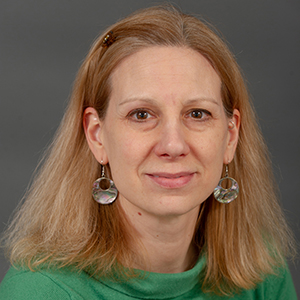
Departments of Health Promotion and Policy, and Biostatistics and Epidemiology
School of Public Health and Health Sciences
Why the Menstrual Cycle Matters
October 7, 2020
Though nearly half of the world’s population menstruates, very little is known about how the menstrual cycle is associated with other aspects of health. However, exciting new evidence suggests that the timing of someone’s final menstrual period and whether they experience premenstrual symptoms in their 20s, 30s and 40s may predict their health after menopause. In this talk, Professor Elizabeth Bertone-Johnson will discuss how these aspects of the menstrual cycle may predict long-term risk of cardiovascular disease and diabetes. If it can be determined whether these menstrual-related factors may be early sentinels of future disease, this knowledge can be used to identify young women to target for early intervention. Bertone-Johnson will present results from her research investigating how modifiable factors such as diet, smoking, weight gain, and behavioral health play important roles in these relations, and discuss how improving health behaviors in adolescence and young adulthood may have lasting positive impacts on women’s health.
Professor Panos Kevrekidis
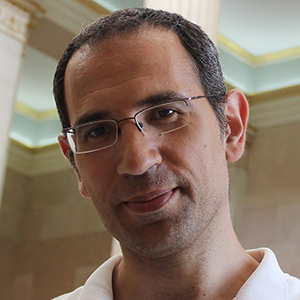
Department of Mathematics and Statistics
College of Natural Sciences
Nonlinear Waves and their Applications: From Oceans to Planets, From Lasers to Quantum Fluids, From Origami to Pandemics
November 10, 2020
In this talk, Professor Panos Kevrekidis will explore a number of ideas about nonlinear waves and their implications to a diverse array of fields: from mathematics to physics, engineering, computing, biology, and even (a little) art. He will begin with some history from 18th and 19th century fluid waves in channels and oceans, associated engineering observations, and artistic renderings. Next, he will share an intriguing story of (non) equity and inclusion around the first computer in post-atomic-bomb Los Alamos National Lab. The presentation will then pass through some Nobel Prize winning physical ideas related to the laser, quantum fluids, and some of their recent variations pursued experimentally including here in Amherst. Finally, the audience will learn how in the past few years such wave phenomena have emerged in exotic materials, such as lattices made of origami elements, and how in the last few months they are being considered toward studying the spread of pandemic infections. Time permitting, Kevrekidis will also touch upon the intriguing work of the UMass Amherst chancellor in the field of nonlinear waves!
Professor Daniela Calzetti
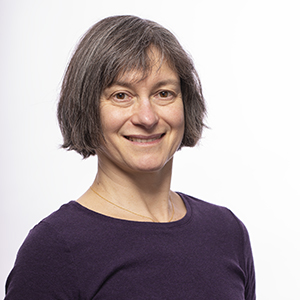
Department of Astronomy
College of Natural Sciences
Stars Are Not “Spherical Cows”
December 1, 2020
Stars are the sources of all the light we see in the universe. Whether investigating our own celestial neighborhood or the most distant corners of the universe, we use stars as our beacons. The universe is mostly made of dark energy, and galaxies and clusters mostly of dark matter. But it is stars like our sun that trace them all. Stars are not eternal balls of gas churning out energy from their nuclear furnaces. They are born, they live, and they die. The birth of stars is particularly important as it can be traced back to the birth and evolution of galaxies across cosmic times. Professor Daniela Calzetti will review progress over the past decade in understanding how stars form out of the gas clouds that pervade galaxies, and how this has helped with furthering our understanding of the universe. Space missions, as well as advanced ground-based telescopes, have played key roles in advancing our knowledge. With many challenges still ahead of us, the way forward will require innovative thinking for the future missions and facilities that will enable humanity one day to say, “We know where we came from.”
Distinguished Faculty Lectures 2019
Professor Carol E. Heim
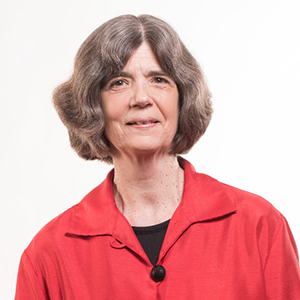
Who Pays, Who Benefits, Who Decides? Property Developers and the Political Economy of Urban Growth
March 27, 2019
Property developers reap a return sometimes called "development gain," which is over and above the ordinary rate of profit. They often use legal and political means to increase their share of economic value created through urban development. Their interests are sometimes, but not always, in alignment with the public good. Historical research on the boom cities of Chicago and Phoenix, particularly concerning infrastructure finance, illustrates their goals and activities. Examination of current policy issues in cities such as Houston and Miami, which are facing severe impacts of natural disasters and climate change, also provides opportunities to explore the role of developers in U.S. cities and suburbs.
Shlomo Zilberstein
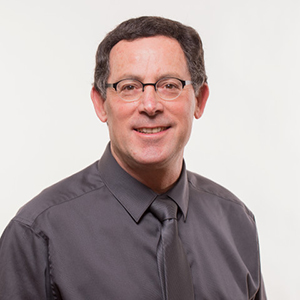
College of Information and Computer Sciences
AI Will Change Everything, But Not So Fast
April 18, 2019
The field of artificial intelligence (AI) is experiencing a golden age. Scientific breakthroughs and game-changing technologies are rapidly altering the way we live, work, communicate, and entertain. Investment in AI is booming. Meanwhile, success stories and inevitable failures fuel speculations about the aggregate impact of AI on society. In this talk, I give a historical perspective on the development of AI, including the pattern of research leaps followed by exaggerated expectations. With today’s best AI methods, it is easy to create a grandmaster chess player, but replicating the common sense of a three-year-old child remains elusive. I will examine these challenges using insights from my research on automated reasoning, autonomous driving, and human-in-the-loop AI. The ability to sustain progress and responsibly deploy AI technology depends on a far better understanding of how humans use common sense to handle ordinary situations that they encounter every day.
Distinguished Faculty Lectures 2018
Professor Samuel Black
 Department of Veterinary and Animal Sciences
Department of Veterinary and Animal Sciences
Approaching the End Game: Seeking Sustainable Control of Animal African Trypanosomiasis
February 5, 2018
For more than a century, scientists have attempted to sustainably control animal African trypanosomiasis—protozoan parasites that can be fatal to people and domestic livestock. The development of effective vaccines has been blocked by the parasites’ ability to vary the surface structures with which the immune system reacts and to mask the conserved surface components the parasites need to acquire nutrients. At UMass Amherst and elsewhere, research is unlocking the mechanisms of innate immune control and trypanosomiasis pathology, giving new hope of developing trypanosomiasis-resistant cattle through selective breeding and genetic engineering.
Professor Maria Santore
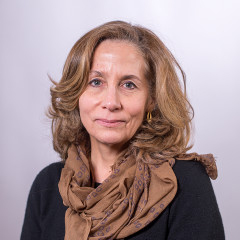 Department of Polymer Science and Engineering
Department of Polymer Science and Engineering
From the Surfaces of Cells to Materials Innovation: Synthetic Systems that Mimic the Behaviors of Biological Cells
March 6, 2018
When cells contact other cells or foreign objects, their responses can determine an organism’s survival. For example, reactions triggered at the surfaces of white blood cells amplify to produce organism scale behaviors, such as fighting infection or developing immunity.
Synthetic systems from the Santore lab recreate biological mechanisms that start at the surface and become large scale—examples will include materials that selectively scavenge, capture, kill, or release targets in response to chemical and mechanical cues; control particle movement on surfaces; and assemble into molecularly thin force-responsive reconfigurable circuitry. These systems may ultimately facilitate biomedical devices, sensors, and protective gear or materials for energy harvesting.
Professor Léonce Ndikumana
Capital Flight From Africa: Is the World Genuinely Ready for Action?
April 9, 2018
Domestic and global structural factors have caused a sustained outflow of capital from Africa, a continent that faces deep development financing constraints. This lecture will explain how capital flight is part of a pattern of integration of Africa into the global economy that has entrenched the continent’s exploitation and marginalization. It will also show how structural flaws in the global economic system and its governance make it difficult to combat capital flight and illicit financial flows from Africa and propose new ways to address these problems.
Distinguished Faculty Lectures 2017
Professor Donald Fisher
The Eyes Have It: A Window into the Mind
A common thread links long-standing questions in cognitive science, gerontology, transportation, and health care. Cognitive scientists want to know whether we really need to put aside our cell phones while driving.
Professor Duncan Irschick
Bioinspiration and Life in 3-D
Nature-inspired solutions are being discovered for some of the most intransigent problems that society faces, such as potential cures for cancer from animal and plants, novel antibiotics, and gecko-inspired adhesives.
Professor Christian Appy
The Atomic Origins of America’s National Security State: How Nuclear Weapons Produced an Imperial Presidency and Degraded Democracy
From the Manhattan Project to the Global War on Terror, nuclear weapons have had a pernicious impact on American political culture.
Professor David Reckhow
Drinking Water in Crisis: Lead, Lignin, and Legionella
As events continue to unfold in Flint, Michigan, the nation is more than ever focused on the quality of its drinking water.
Professor Nilanjana Dasgupta
STEMing the Tide: How Female Professors and Peers Can Encourage Young Women in Science, Technology, Engineering, and Mathematics
The choice to pursue a given professional path may feel free but is often constrained by subtle social cues about who does and doesn’t “belong there.”